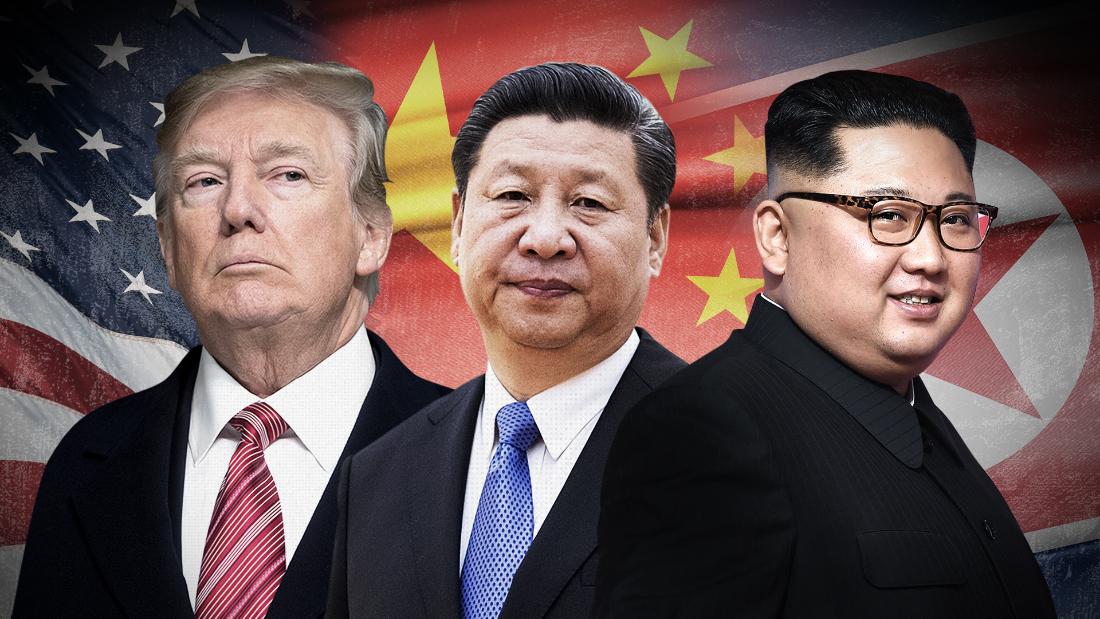
It's a dramatic reversal from months ago, when Moon looked on track for a Nobel Peace Prize for bringing the two parties together and securing both an historic summit between himself and North Korean leader Kim Jong Un, and later between Kim and Trump. While China supported this effort, North Korea's traditional ally seemed at risk of being sidelined, as Pyongyang looked south for support both economic and diplomatically.
But after the second Kim-Trump meeting fell apart in Hanoi without a deal, Xi's influence has increased again. Meanwhile, Pyongyang has tested short-range weapons and unleashed a propaganda broadside against Seoul, in apparent punishment for Moon's failure to keep the peace process moving along and unwillingness to provide sanctions relief where Washington will not.
"Relations are moving forward on the basis of the personal relations between Comrade Chairman (Kim Jong Un) and the US President," North Korea's foreign ministry said this week. "The South Korean authorities would better mind their own internal business."
Sanctions were the main sticking point in Vietnam, and they are also a point where China can come to Pyongyang's aid. Always North Korea's greatest economic ally, China has supported tough moves by the United Nations against Kim's regime since he ramped up nuclear and missile testing, but that does not mean Beijing is committed to Trump's "maximum pressure" campaign.
Trump is in South Korea Sunday for his first visit to the Korean Peninsula since talks with Pyongyang began, he is expected to visit the demilitarized zone (DMZ) between the countries, where he has teased that he may meet Kim in person.
While he has framed any potential meeting as more of a photo-op than anything else, the US President appears to be in a deal making mood, buoyed by a successful meeting with Xi at the G20 after which he rolled back some of Washington's restrictions on Chinese telecoms giant Huawei.
Xi appears to have gotten what he wanted then from the meetings in Osaka, it remains to be seen now if he will use his influence on Kim to get Trump something he wants in South Korea. The three leaders are in a diplomatic triangle, each relying on the others to get them what they desire.
Grand bargaining
In theory, governments are supposed to be able to consider various issues and disputes between them separately: we may be at odds on X but we can still cooperate on Y.
It's debatable whether this was ever the case, but Trump -- in true iconoclastic style -- has thrown it out of the window on several occasions. In May he suggested a trade deal with Beijing could include reducing pressure on Chinese telecoms giant Huawei, despite US concerns about the company supposedly being security rather than economic. On North Korea too, Trump has said China's assistance with Pyongyang could benefit Beijing.
"China has great influence over North Korea. And China will either decide to help us with North Korea, or they won't," Trump said in 2017. "If they do, that will be very good for China, and if they don't, it won't be good for anyone."
Trump has also shown himself to be a fan of a grand bargain, even throwing out years of previous work by US negotiators in favor of reaching a deal on his terms. One of the reasons it is believed the Hanoi summit fell through is because Pyongyang was pushing for gradual progress in exchange for some sanctions relief, while Washington wanted a much further reaching agreement that would settle the matter -- and give Trump something to boast about heading into 2020.
While we don't know the exact details of what Trump and Xi discussed at the G20 this week, Trump has previously underscored the potential economic benefits of a nuclear agreement. And no doubt an open and market orientated North Korea would be sure to benefit Chinese businesses as much as those in the US.
Winners and losers
So what do the players in this diplomatic triangle want from each other, and who's more likely to come out of this month's meetings happy?
Xi is in perhaps the most secure position: He wants relief from US tariffs, but when it comes to North Korea, Beijing has shown itself willing to play both sides, piling the pressure on Pyongyang to reign in its nuclear and intercontinental ballistic missile (ICBM) testing, but also happy to provide aid and support when necessary, especially if it weakens rivals Washington and Seoul at critical times.
Kim has made it clear that he wants relief from the crippling international sanctions imposed in the wake of his weapons testing, to enable the North Korean economy to grow and in particular attract investment from the South. But failing that, economic support can come from China instead, and if the US is not willing to move on sanctions, Pyongyang can refuse to further denuclearize safe in the knowledge that Beijing -- and probably Seoul as well -- will not support a return to the maximum pressure and fire and fury approach of two years ago.
That leaves Trump. Washington definitely has the most to offer the other two sides, relief from sanctions and the trade war, but US demands -- capitulation from China on trade issues and full denuclearization of North Korea -- are also far harder to achieve, especially if Trump is not willing to compromise.
A more adept negotiator could likely broker some short term successes and move the game forward, by for example getting China to agree to pressure North Korea to agree to a denuclearization time frame and international inspections in return for some sanctions relief and a dropping of certain trade tariffs.
But that's a messy, complicated process that won't lead to any big headline wins. Whether Trump can work both sides of the triangle he's found himself trapped in remains to be seen.
No comments:
Post a Comment